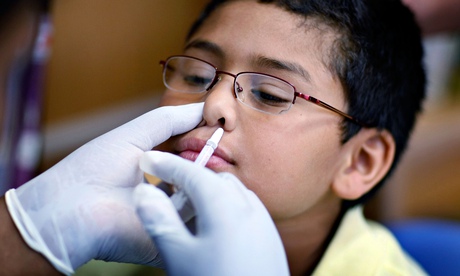
If you’ve had a doctor’s letter inviting your children to have a nasal-spray flu vaccine – are you going to say yes? The Joint Committee on Vaccination and Immunisation advises UK government departments on vaccination issues, and has a programme to vaccinate all children between the ages of two and 16, starting with the youngest.
Children spread influenza, and vaccinating them will protect elderly and very young people, as well as those with existing medical conditions. It should also protect the children themselves. A Lancet paper quoted childhood deaths in England from influenza as being two per million for under 14s. In one year during the influenza A H1N1 pandemic a total of 70 children died, 15 of whom were healthy before falling ill.
Symptoms of influenza include fever, muscle pain, sore throat, headache and cough and complications include pneumonia and ear infections. NHS Choices says the nasal spray is safer and more effective than the injected vaccine and has only minor side-effects such as a runny nose, fever, muscle ache and headache. Worse side-effects, such as seizures, have only rarely been reported. NHS Choices says the vaccine is expected to save 2,000 deaths in the population. So shouldn’t you be booking your pre-schooler for their jab right now?
The solution
I’m a big fan of vaccines and feel anxious questioning any of them. But the BMJ (where I work) has published papers questioning the quality of evidence for the benefits of the influenza vaccine, and whether industry-funded trials have reported “over-optimistic” results. I ask Tom Jefferson, the lead author of the Cochrane Review on Vaccines for Preventing Influenza in Healthy Children, which looked at findings from 75 studies, if I should give my four-and-a-half-year-old the nasal vaccine spray.
“No,” he says, because the trials show a reporting bias on the harms of the live attenuated influenza vaccine (the form of vaccine delivered nasally). “Influenza vaccines are about marketing and not science,” he says. “We have few trials, and masses of very poor quality observational evidence. We have presented evidence of considerable reporting bias, which governments continue to ignore. The science is missing and so making an informed decision is very difficult.”
Jefferson also believes that the evidence of harm may be under reported because of a lack of standardised safety-outcome data. The Cochrane review does say that vaccination can protect children from influenza but there is not conclusive evidence that vaccinations reduce hospitalisations and deaths in children. This does not mean vaccinations won’t reduce these risks and you may feel it’s worth vaccinating your child in the hope they will. But it’s worth knowing that the studies supporting this public health initiative are not nearly as good as they should be.

